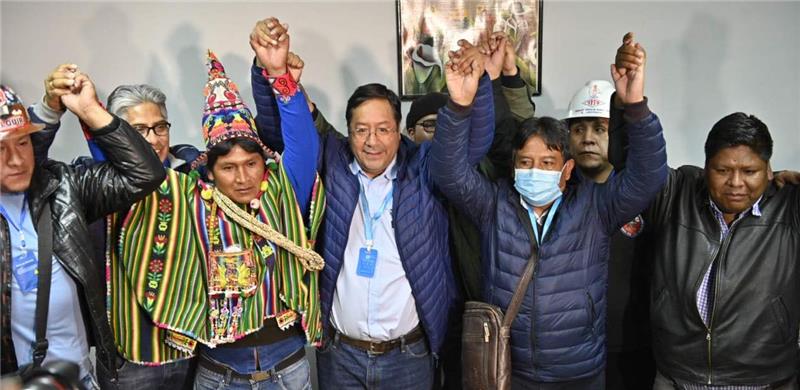Exit polls from Sunday’s presidential election in Bolivia show leftist candidate Luis Arce winning a surprise outright victory without the need for a runoff. Interim President Jeanine Áñez, a political rival of Arce, tweeted congratulations to Arce and his running mate, asking them to “govern with Bolivia and democracy in mind.” If the results are confirmed, to what can Arce attribute his victory? What policies can be expected of his government? Will the transition be peaceful, and what role will former President Evo Morales, currently living in exile, play in it? Which parties appear poised to take control of Bolivia’s Legislative Assembly, and how well will Arce be able to work with them?
Renata Segura, deputy director for Latin America and the Caribbean at International Crisis Group: “Luis Arce’s victory confirms that the Movement Toward Socialism (MAS) remains Bolivia’s strongest political force and reveals the unpopularity of the interim government that has ruled the country for a year. Many MAS supporters had turned away from the party in the October 2019 election, offended by former President Evo Morales’ desire to cling onto power despite having lost a referendum to abolish limits on re-election. Bolivians have returned to support a party that had ruled for 14 years with a pro-Indigenous and left-leaning but economically orthodox approach. The results also point to a public rebuke of anti-MAS politicians tainted by the intransigence and thinly veiled racism of some of interim President Áñez’s allies. Arce’s first press conference set a conciliatory tone: ‘we will govern for all Bolivians, and we will build a government of national unity.’ Preliminary results show that while MAS continues to be the strongest party in the Senate, they will not have a supermajority that allows them to pass laws without alliances. Establishing a working relationship with opposition parties will be indispensable, although some may not be willing. Arce also said MAS has learned from its mistakes. The president-elect knows he inherits a deeply fragmented country, burdened by additional health and economic crises. Latin Americans’ strong presidentialist tradition means Arce should have space to build a more technocratic and conciliatory MAS presidency. However, Morales’ almost certain return to Bolivia will test the party’s internal cohesion and Arce’s mettle.”
Roberto Laserna, director of the Center for the Study of Economic and Social Reality (CERES) in Cochabamba, Bolivia: “The Covid-19 pandemic and the way it has put additional economic stress on the majority of the population made people remember the good old days of the export bonanza, when Luis Arce was finance minister. The economy became voters’ main concern, and the promise of going back to those days was attractive enough. Arce and Mesa knew that, and both promised the same thing: increased fiscal expenditures to protect consumers. In the end, voters choose to believe the former minister in the hope that he will ‘do it again.’ The problem is that Arce believes that his actions led to the bonanza, not previous investments or increasing prices. But this time, he will face declining international reserves and a mounting fiscal deficit. He distrusts international lenders and investors, so he announced his intention to increase taxes, a difficult task when only 30 percent of citizens bear the tax burden. Arce will also have other challenges in his relationship with Evo Morales and lawmakers. Somehow, he also defeated Morales, getting more votes on his own, which will make it hard for him to concede power and accept a subsidiary role to Morales. He will not have full control of the Legislative Assembly, and so will need to work with the opposition. Finally, in three or four months, there should be local elections in which the opposition may regain control of some departments and municipalities. A challenge for Arce will be to work with them with a smaller budget. Sunday’s election eliminated one uncertainty, but it created others.”
Bret Gustafson, associate professor of sociocultural anthropology at Washington University in St. Louis: “Bolivia has given the world a lesson in democracy. After MAS President Evo Morales was ousted in a coup last November and in the wake of enduring 11 months of an often brutal and incompetent interim government, the country overwhelmingly voted to return the presidency and most of the Legislative Assembly to the MAS. Even the right-leaning El Deber newspaper acknowledged the ‘clear and crushing victory’ for MAS candidates Luis Arce and David Choquehuanca. Exit polls gave Arce a whopping 52 percent of the vote. Carlos Mesa had to come within 10 percentage points to get to a runoff round, but at 32 percent was nowhere close. Coming in third was Luis Fernando Camacho (14 percent). Camacho had gained some attention as a presidential aspirant during the November 2019 putsch, but was reduced to a spoiler candidate whose achievement was only to gain a few seats in the Assembly. Polls suggested Mesa would get to a second round, which most thought he could win. Yet polls consistently undercount the rural vote. Evo Morales will surely return to Bolivia and may complicate the situation for Arce. Additionally, the decline of natural gas prices, exports and reserves will make Arce’s job more difficult. Arce will also have to deal with demands from the business and agroindustrial sectors, which have long relied on state subsidies. Arce has said that his party, the MAS, will address the ‘errors of the past,’ but the MAS will also face renewed critiques from its left flank, where many see too many compromises with big business, corruption and a tepid approach to GMOs, the environment, and Indigenous and women’s rights. The pandemic is still going on too. Yet for the moment, Bolivian democracy has indisputably and unquestionably been restored.”
Mareike Winchell, assistant professor in the Department of Anthropology at the University of Chicago: “Arce can attribute this victory to rural and Indigenous support, including among Indigenous farmers and vendors living abroad. Arce’s victory also reflected his regaining of votes that Morales, in 2014 and 2019, had lost. This suggests that interim President Áñez’s strategy of intimidation, violence and political persecution against MAS officials, trade unions and Morales supporters served to galvanize popular support for the MAS. The next days are crucial. Morales’ 2019 ousting took 38 lives. By contrast, Áñez has formally acknowledged Arce’s victory and called on Bolivians to respect the electoral process. Given opponents’ acceptance of Arce’s win, a smooth transition seems likely. In response to the results, Morales tweeted: ‘we have returned as millions, now we the people will regain our dignity and liberty.’ While he will not play a formal role in Arce’s government, for his supporters this election marks a redemptive moment of reclaiming power after a brutal year of political tumult and persecution. In the coming weeks, Bolivia’s Plurinational Legislative Assembly, comprised of senators and deputies from MAS as well as Mesa’s Civic Community and Camacho’s Creemos parties, will face the difficult task of confronting the fallout from a debilitating year of protests, rampant Covid-19 infections and a stalled national economy.”
John Walsh, director for drug policy and the Andes at the Washington Office on Latin America: “Two unofficial quick counts indicate a resounding first-round victory for MAS presidential candidate Luis Arce, whose candidacy benefited from the disastrous performance of the interim government led by Jeanine Áñez. Bolivians viewing Áñez’s time in power as a dress rehearsal for a possible center-right coalition government were turned off by the brutal, vengeful and inept conduct on display. By comparison, Arce’s own reputation as a steady hand—technically competent and not charismatic—offered the prospect of calm proficiency to a population tired of conflict. Arce’s new government will face enormous challenges, with Covid-19 raging and the economy in difficult straits. Most Bolivians will expect him to defend the gains in social inclusion achieved under previous MAS governments, but also to find common ground with political opponents in the legislature to find practical solutions to the country’s pressing problems—including endemically weak justice institutions and impunity for human rights violations. The interim government remains in power until the new authorities are sworn in, and hardline elements unreconciled to the prospect of a MAS government could be tempted to stoke conflict. But Arce’s wide margin of victory deflates the fraud narrative that was being pushed ahead of the voting. The emergence of a new cadre of MAS leaders following last year’s ouster of Evo Morales—punctuated now by Arce’s strong showing—underscores that the MAS is bigger than Morales. Paradoxically, this could make possible for Morales a role as an elder statesman, a prospect that his overreach in seeking re-election last year had seemed to destroy.”
 The Latin America Advisor features Q&A from leaders in politics, economics, and finance every business day. It is available to members of the Dialogue’s Corporate Program and others by subscription.
The Latin America Advisor features Q&A from leaders in politics, economics, and finance every business day. It is available to members of the Dialogue’s Corporate Program and others by subscription.


